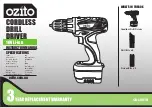
8
Selecting the action mode
This tool employs an action mode changing lever. Select
one of the four modes suitable for your work needs by
using this lever.
For rotation with impact, turn the lever so that the arrow
on the lever points toward the
mark on the tool body.
(Fig. 5)
For rotation with hammering, turn the lever so that the
arrow points toward the
mark on the tool body.
(Fig. 6)
For rotation with clutch, turn the lever so that the arrow
points toward the
mark on the tool body.
(Fig. 7)
For rotation only, turn the lever so that the arrow on the
lever points toward the
mark or the
mark on the
tool body.
(Fig. 8)
Sliding to the
mark is for high rotation and the
mark is for low rotation.
(Fig. 9)
Before operation, always make sure that the lever is cor-
rectly set to your desired mode mark and use the tool at
an appropriate speed for your work.
CAUTION:
• When using the action mode change lever, use only
when the tool stops. But when the lever does not easily
move, pull the switch trigger slightly to rotate the spin-
dle and then move the lever.
• Always set the lever correctly to your desired mode
mark. If you operate the tool with the lever positioned
halfway between the mode marks, the tool may be
damaged.
Adjusting the fastening torque (Only for
screwdriving operation mode
) (Fig. 10)
The fastening torque can be adjusted in 16 steps by turn-
ing the adjusting ring so that its graduations are aligned
with the pointer on the tool body. The fastening torque is
minimum when the number 1 is aligned with the pointer,
and maximum when the number 16 is aligned with the
pointer.
The clutch will slip at various torque levels when set at
the number 1 to 16.
Before actual operation, drive a trial screw into your
material or a piece of duplicate material to determine
which torque level is required for a particular application.
NOTE:
• In modes other than screwdriving mode, the adjusting
ring can be placed at any position because it does not
work.
ASSEMBLY
CAUTION:
• Always be sure that the tool is switched off and the bat-
tery cartridge is removed before carrying out any work
on the tool.
Installing or removing driver bit or socket bit
Use only the driver bit or socket bit shown in the figure.
Do not use any other driver bit or socket bit.
(Fig. 11)
For European and North & South American coun-
tries, Australia and New Zealand
For other countries
1.
To install the bit, pull the sleeve in the direction of the
arrow and insert the bit into the sleeve as far as it will
go. Then release the sleeve to secure the bit.
(Fig. 12)
2.
To install the bit, pull the sleeve in the direction of the
arrow and insert the bit-piece and bit into the sleeve
as far as it will go. The bit-piece should be inserted
into the sleeve with its pointed end facing in. Then
release the sleeve to secure the bit.
(Fig. 13)
To remove the bit, pull the sleeve in the direction of the
arrow and pull the bit out firmly.
NOTE:
• If the bit is not inserted deep enough into the sleeve,
the sleeve will not return to its original position and the
bit will not be secured. In this case, try re-inserting the
bit according to the instructions above.
Hook (Accessory) (Fig. 14)
CAUTION:
• When installing the hook, tighten the screw firmly. Fail-
ure to do so may cause the breakage of the tool or per-
sonal injury.
The hook is convenient for temporarily hanging the tool.
This can be installed on either side of the tool.
To install the hook, insert it into a groove in the tool hous-
ing on either side and then secure it with a screw. To
remove, loosen the screw and then take it out.
OPERATION
CAUTION:
• Always insert the battery cartridge all the way until it
locks in place. If you can see the red part on the upper
side of the button, it is not locked completely. Insert it
fully until the red part cannot be seen. If not, it may
accidentally fall out of the tool, causing injury to you or
someone around you.
Impact driver operation
When driving wood screws or bolts, set the action mode
changing lever to the
mark. The adjusting ring can be
placed at any position.
Screwdriving (Fig. 15)
Hold the tool firmly and place the point of the driver bit in
the screw head. Apply forward pressure to the tool to the
extent that the bit will not slip off the screw and turn the
tool on to start operation.
A = 12 mm
B = 9 mm
Use only these type of bit. Follow the
procedure (1).
(Note)
Bit-piece is not necessary.
A = 17 mm
B = 14 mm
To install these types of bits, follow the
procedure (1).
(Note)
Makita bits are these types.
A = 12 mm
B = 9 mm
To install these types of bits, follow the
procedure (2).
(Note)
Bit-piece is necessary for installing the
bit.
Содержание BTP130
Страница 2: ...2 1 2 3 4 5 6 7 8 7 7 7 7 6 A B 5 4 2 1 3 ...
Страница 3: ...3 9 10 11 12 13 14 15 15 16 14 11 13 12 11 12 8 9 10 7 ...
Страница 5: ...5 22 23 29 28 28 ...








































